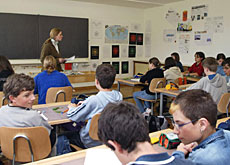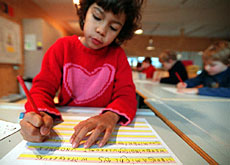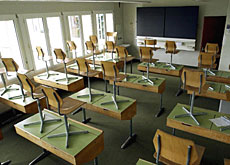Teachers told to ditch dialect for High German

Teachers across German-speaking Switzerland are being urged to use High German rather than dialect in the classroom.
The move, which coincides with the start of the academic year, is aimed at improving literacy levels among Swiss teenagers.
An international study conducted by the Organisation for Economic Cooperation and Development (OECD) in 2001 found that up to 20 per cent of Swiss 15-year-olds could not understand even the most basic written information.
The findings of the Programme for International Student Assessment (Pisa) shocked the educational establishment and put pressure on cantonal educational directors to come up with solutions.
Pupils in German-speaking Switzerland typically use dialect in everyday conversation and to write SMS messages or emails.
Whereas High German is the language of writing and reading, and is recommended for use in schools.
But since the 1980s, dialect has gained ground, creeping into advertisements, television and even classrooms – a trend the authorities are keen to reverse.
Increasing use of dialect
A study conducted at the end of last year in canton Zurich’s primary and secondary schools revealed that 30-50 per cent of all teaching was conducted in dialect.
Zurich’s teachers were issued with instructions before the summer holidays encouraging them to use High German in their schools from as early an age as possible.
“It’s more of a problem with the teachers than the pupils,” Peter Sieber, co-author of the brochure issued to teachers, told swissinfo.
“In our training programmes, we are putting more emphasis on High German so that teachers can express themselves better.”
In general, High German is abandoned in sport, music, art and handicraft classes, as well as group activities and personal discussions.
Academic performance
Authors of the brochure said this practice created problems. They said that for many pupils, High German was seen as an intellectual language associated with academic performance.
It was hardly surprising therefore that pupils were not keen on it and not particularly motivated to speak, write and read High German.
The pamphlet was put together for the canton’s education department by Zurich’s teacher training college.
However, many cantonal authorities have issued directives on this subject in the past but they have been largely ignored.
“It’s a long process because the teachers have to change their own attitudes to German,” added Leon Müller, a school inspector from canton Uri.
Cantonal education officers hope that continued teacher training and regular school testing will combat the problem.
swissinfo with agencies
Teachers are being urged to use High German rather than dialect in the classroom.
The move follows a study in 2001 that 20 per cent of 15-year-olds could not understand basic written information.
Cantonal education officers say teachers and pupils need to be persuaded of the benefits of High German.

In compliance with the JTI standards
More: SWI swissinfo.ch certified by the Journalism Trust Initiative










You can find an overview of ongoing debates with our journalists here . Please join us!
If you want to start a conversation about a topic raised in this article or want to report factual errors, email us at english@swissinfo.ch.